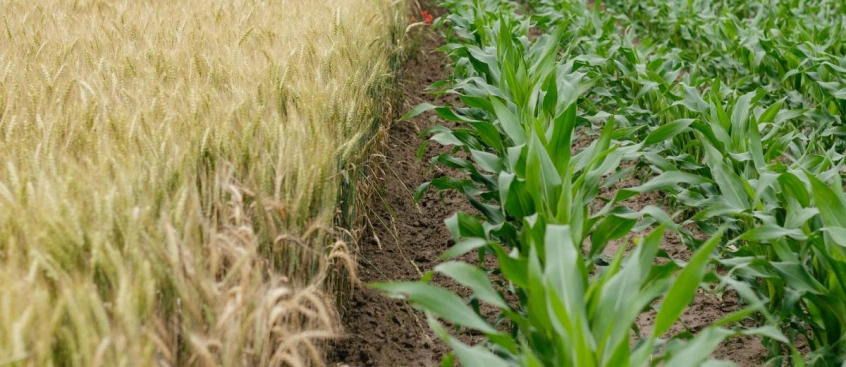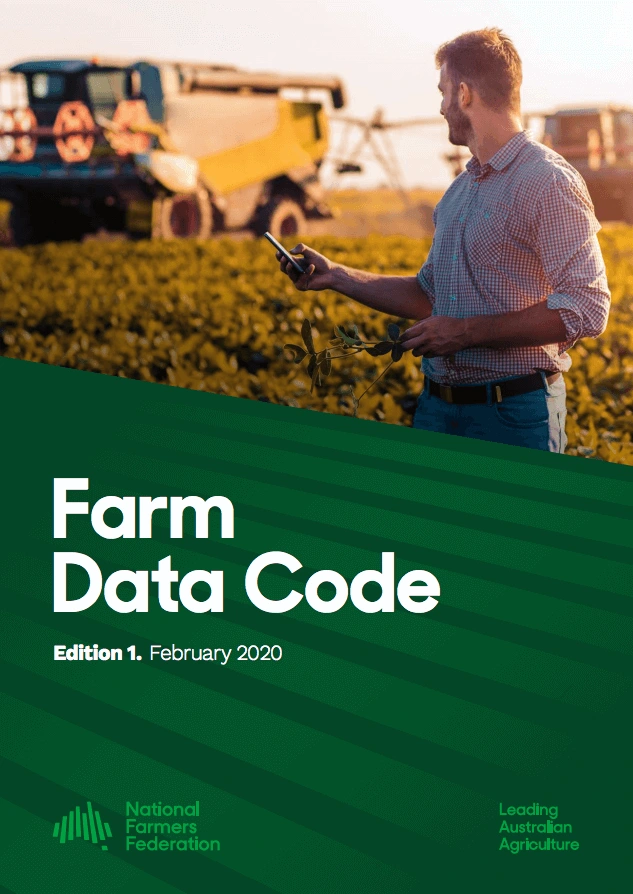
National Farmers’ Federation develops Australian Farm Data Code
Feb 24 2024

The Australian Farm Data Code aims to promote adoption of digital technology by ensuring that farmers are comfortable in how their data is used, shared and managed.
Developed and adopted by the National Farmers’ Federation in consultation with industry, the new National Farmer’s Federation Australian Farm Data Code is an easy to understand guide that producers can refer to and share with anyone else who has access to their data.
The code provides a framework for producers, farmers, technology vendors, service providers, agronomists, researchers, banks and anyone else who wants to access your data.
The code is useful for referring to when creating your own policies for service providers who manage your own farm data, or data on behalf of your customers/farmers/producers (if you’re a service provider yourself).
Farmers and producers can also use the code evaluate the policies of providers who have created their own policies and processes.
Benefits to farmer/producers include:
• increased awareness and understanding of the ways in which providers are collecting, using and sharing farm data;
• a framework to compare providers and inform negotiations about data policies; and,
• improvements to industry-wide data practices over time.
Benefits for service providers include:
• clear and agreed guidance on data policies; and,
• a helpful framework to inform discussions with farmers about data.
Development of the Code
The Farm Data Code was developed National Farmers’ Federation’s Farm Data Working Group – bringing together farmers, researchers and agricultural technology providers.
Members of the Farm Data Working Group include:
• Andrea Koch, Andrea Koch Agtech (Chair)
• Phil Lavers, NSW Farmers
• Chris Sounness, Wimmera Development Association
• Emma Weston, AgriDigital
• Warren Jennings, Telstra
• Jay Sanderson, University of the Sunshine Coast
• Leanne Wiseman, Griffith University
• Leighton Wilksch, AgByte
• Mark Pawsey, Proagrica
• Nick Bryant, Farmers Edge
• Richard Heath, Australian Farm Institute
• Tony Murray, Council or Rural Research and Development Corporations
• Ben van Delden, KPMG
View / Download the code as a pdf
John Deere’s Australian precision agriculture segment manager Mr Kelly went on to say that phase one of DataConnect would allow producers operating John Deere, Claas, New Holland, Case IH or Steyr branded farm equipment to share fleet data, including current and historical machine location, current fuel tank level, working status and forward speed.
Operators would be able to choose which platform they use to access the data, with the initial roll-out including John Deere Operations Center, AFS Connect, MyPLM Connect, C Telematics or 365FarmNet portals.
The four founding companies are all members of the Agricultural Industry Electronics Foundation, the independent body in charge of implementing electronic standards such as ISOBUS.

Review and Updates to the Code
Following the initial release in February 2020, the code will be subject to two 6-monthly reviews, before continuing in a biennial review cycle.
The Working Group is exploring certification or accreditation models to improve the Code’s uptake and impact.
Provide feedback to the National Farmers Federation on the Code
The NFF welcomes feedback on the code at any time.
You can do this by going to the Contact Us page on their website, by writing to ‘NFF, Locked Bag 9, Kingston ACT AUSTRALIA 2604, or by phoning (02) 6269 5666.
If you would like to know more about the code and what it might mean for your business or partner email us or join the AgTech Finder community on Facebook, Twitter and LinkedIn.
Email us at agtechfinder@foodagility.com
Go to our Twitter page to follow us and mention @agtechfinder
Like AgTechFinder.com on Facebook
Leave the professional AgTech community a comment on the AgTech Finder LinkedIn page
Posted in Practical Advice
You Might Also Like
Apr 08 2025
AgTech News Roundup – 3 April
Issue 006: ABARES Snapshot of Australian Agriculture 2025 released, new agtech manufacturing facility for the Darling Downs, and the Beta version of the Foragecaster app now on AgriWebb marketplace.
Read MoreMar 21 2025
AgTech News Roundup – 20 March
Aussie ag valued at $91bn for 2025/26, says ABARES. Plus, what can Australia learn from New Zealand when it comes to renewable energy? All this, and more, in edition #004 of the Fortnightly Finder.
Read MoreMar 06 2025
AgTech News Roundup – 6 March
Aussie ag valued at $91bn for 2025/26, says ABARES. Plus, what can Australia learn from New Zealand when it comes to renewable energy? All this, and more, in edition #004 of the Fortnightly Finder.
Read MoreFeb 27 2025
AgTech News Roundup – 20 February
The latest product launch from connectivity pioneers, is VC broken for AgTech? The Right to Repair, Funding Opportunities and more.
Is AgTech broken for Venture Capital?
With an estimated value of $97m per year, will Australia legislate the Right to Repair? NFF members want to.
Plus: Funding opportunities you may have missed
Read MoreList your company on AgTech Finder.
AgTech Finder helps Australian Farmers and producers find the product that’s right for them.
Register now to be a part of the community, get access to a national platform and start gaining insights to improve your products.
